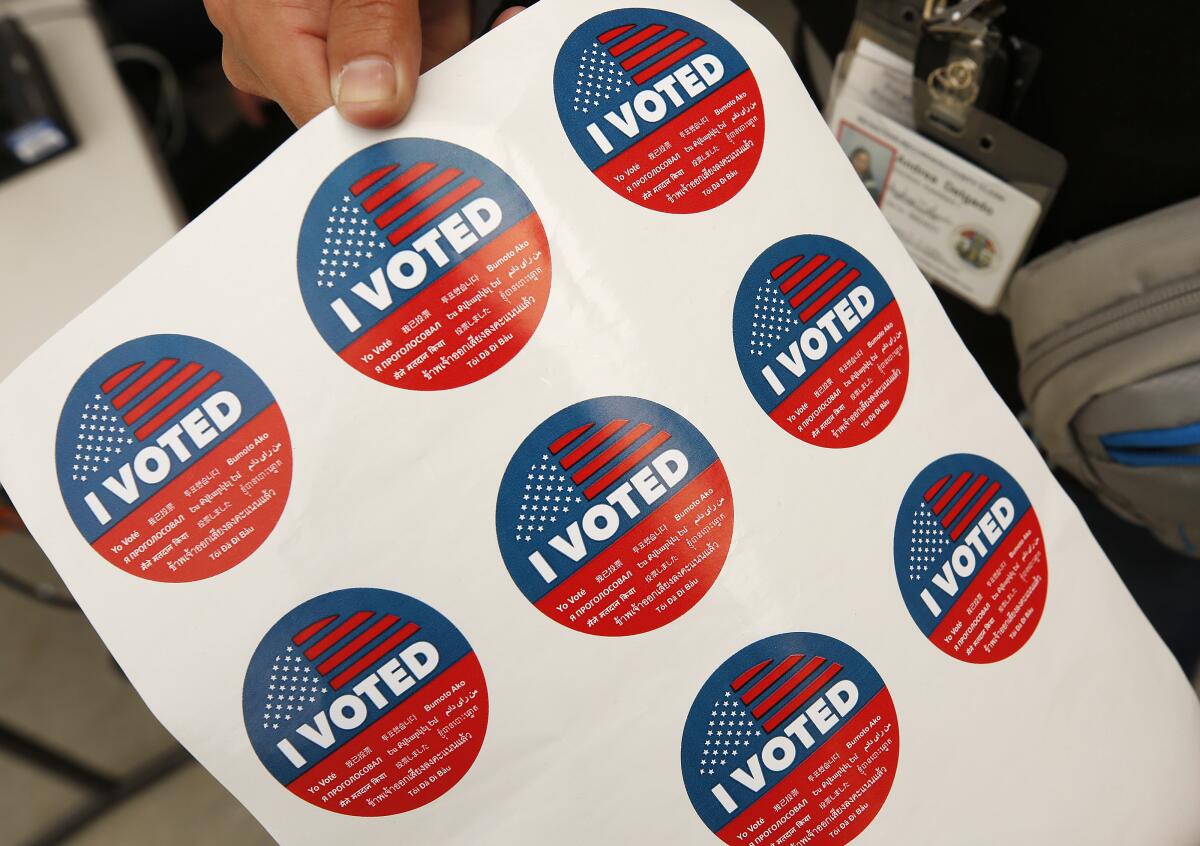Column: It might be time to consider mandatory voting in America

I have long opposed making voting mandatory, an idea that pops up every few years. I still don’t like the idea. But it’s become more attractive, at least as a thought experiment.
The arguments against compelling people to vote — the way Australia and a handful of other countries do — run from the constitutional (it’s coerced speech), to the cultural (this is America, dagnabbit), to the practical and the partisan.
Historically, the practical case is that it’s the wrong solution chasing a nonexistent problem. Proponents of mandatory voting think that low-voter turnout is a sign of civic decay and democratic entropy. This view, no doubt accurate or at least plausible for some people, misses the fact that for many other Americans not voting is a sign of general satisfaction. We had record-breaking turnout in 2020. Raise your hand if think that was proof that America’s civic and democratic commitments are stronger than ever.
More importantly, if voting is virtuous, its virtue — like all virtue — derives from it being voluntary. Compelled virtue is an oxymoron.
Partisanship enters the equation because both parties subscribe to an enduring myth: that increased voter turnout automatically favors the Democrats. Thus, if everyone were forced to vote — many opponents and proponents believe — some imagined reserve army of left-wing voters would swamp the polls. This belief plays a significant role among those who want to make voting easier and those who want to make it harder.
The problem: It’s not true. Yes, of course, turning out more of your own voters is how you win elections, but if everybody voted it’s unlikely that one party would always benefit more than the other. As Daron Shaw and John R. Petrocik demonstrate in their book “The Turnout Myth,” there is no systematic or consistent partisan bias to turnout.” The recent Virginia governor’s race saw huge turnout, and the Republicans routed the Democrats.
Partisan Democrats have all sorts of high-minded and sincere reasons for making casting ballots easier for Black voters in particular and disadvantaged communities in general. But on a practical level, the fact that they think these voters will disproportionately vote Democratic drives many of their policy preferences. Partisan Republicans discount the high-minded arguments and focus on the Democratic advantage they see in such efforts. Meanwhile, Democrats assume any concern with fraud or voter integrity is a ruse for disenfranchising voters.
Republicans tend also to suffer from a weird cognitive dissonance. They fear that if everyone voted, the GOP would lose; but they’ve also convinced themselves that Democrats only win by “importing” voters (i.e. immigrants) and through fraud.
Each party believes — without evidence — that they have the people on their side and that if elections were run “right,” they’d be the majority party. For Democrats this means curtailing “big money” in elections and, lately, federalizing election rules to combat voter suppression. For Republicans, it means catering to Donald Trump’s conspiracy theories and psephological rantings.
More broadly, both parties ignore the closeness of their victories and act as if they have mandates to behave like they have super-majorities supporting them. They then devote their energies to pandering both rhetorically and in terms of policy to the slender slice of the electorate that is their base. The incentive to appeal to the vast middle is shockingly weak even though politicians, like Virginia Gov. Glenn Youngkin last year or Joe Biden in 2020, owe their victories to the persuadable middle.
The incentives for pandering to the hyper-partisans are all too familiar: the pernicious effect of our primary system, self-sorting polarization, an ideologically skewed media ecosystem, and the ease of raising small donations from partisan super-fans. President Biden’s seriously tone-deaf speech on voting rights or Sen. Ted Cruz’s capitulation to Tucker Carlson’s Jan. 6 fantasies are recent examples of this perverse dynamic.
And that’s what appeals to me about mandatory voting. If everybody voted — even just once — it just might dispel the myth that either party speaks for some untapped silent majority. The incentive to drive up the base turnout would evaporate. Low voter turnout — which benefits incumbents and their special interest allies — would not skew election results. Candidates, elected officials and big donors alike would ignore electoral majorities at their peril.
I still oppose this solution, but at least the case for mandatory voting is no longer a solution in pursuit of a problem. Even as a thought experiment, it helps illuminate the real problems we face.
More to Read
A cure for the common opinion
Get thought-provoking perspectives with our weekly newsletter.
You may occasionally receive promotional content from the Los Angeles Times.











